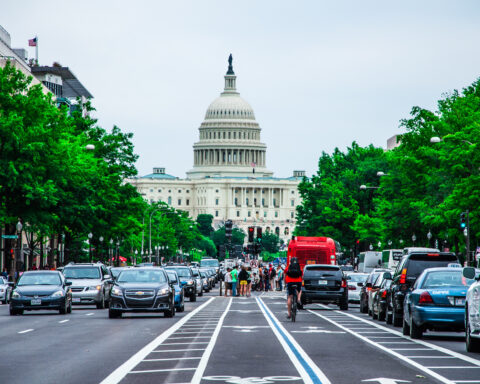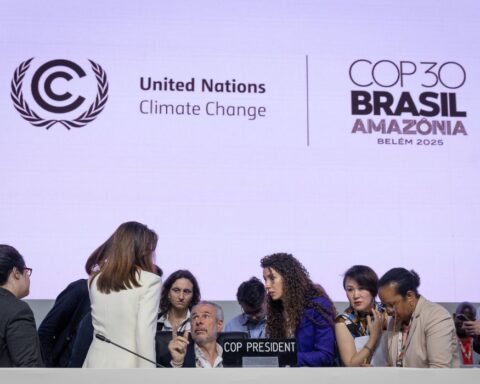Among the limited accomplishments of COP29 last week was the approval of a long-awaited and controversial global framework for carbon offsets. Some climate campaigners welcomed the announcement with cautious optimism. Others warned that the agreement doesn’t fix big mistakes that carbon trading has made in the past.
The voluntary market for carbon credits – separate from cap-and-trade markets regulated by governments – has grown slowly over the last few years, hobbled by loose definitions and lax credit verification. A recent peer-reviewed study of more than 2,000 carbon-credit projects found that only 16% of the projects achieved the carbon savings claimed.
Growth in this market could ramp up significantly, however, after the Conference of Parties (COP29) meeting in Baku, Azerbaijan, approved a framework for recognizing carbon credits in the global accounting of carbon emissions. For the first time, carbon credits will be recognized under the Paris Agreement, enabling countries and companies to use offsets to meet their carbon-reduction targets, potentially giving a huge boost to carbon-credit trading.
The International Emissions Trading Association estimates a carbon market under Paris Agreement rules could save as much as US$250 billion per year by 2030 in mitigation costs, far larger than the savings under the current market.
“We have ended a decade-long wait and unlocked a critical tool for keeping 1.5 degrees in reach,” said COP29 President Mukhtar Babayev.
Environmental Defense Fund, a U.S. group advocating market-based solutions to climate change, cautiously praised the deal. “While its true impact will hinge on strong implementation that delivers measurable benefits for people and nature, this agreement represents a historic opportunity to elevate carbon markets as a tool for meaningful climate action.”
But some critics said that nothing of substance was achieved in Azerbaijan since the existing carbon market system remains. They fear the market will grow quickly, providing an inexpensive and easy way for emitters to meet their climate pledges without doing the hard and expensive work of reducing their greenhouse gas emissions.
The COP29 guidelines will create “cowboy carbon markets at a time when the world needs a sheriff,” said Carbon Market Watch, an international advocacy group.
Persistent skepticism for carbon credits
Carbon credits are certificates issued by projects like reforestation or renewable-energy ventures for emissions avoided, reduced or removed. The certificates are purchased by large or hard-to-abate emitters like oil companies or airlines in order to offset their own emissions.
One of the big problems with the COP29 agreement is that there are no standards for what constitutes a quality carbon credit. Renewable-energy projects, for example, have sometimes been credited with generating “avoided emissions” even though the projects have resulted in no measurable emission reductions because the projects would have been built regardless of the credit. The Integrity Council for the Voluntary Carbon Market – a private organization – recently rejected renewables for its carbon-credit standard.
The fact that nations can set their own standards in country-to-country deals is a large loophole in the COP29 pact, making it “the biggest threat to the Paris Agreement,” Oxford University researcher Injy Johnstone told AFP (Agence France-Presse).
At least one major international bank, HSBC, is voting with its feet. Only days before COP29 approved the carbon agreement, the bank shut down plans to launch a major carbon trading desk, according to Bloomberg. The shutdown is a sign that buyers and traders have cooled on carbon offsets. Delta Airlines, Google and EasyJet are among a growing list of companies that have abandoned carbon-offset purchases, focusing instead on work to reduce their own emissions.
Do offsets still have a role in reducing emissions?
The Science Based Targets initiative (SBTi), widely viewed as the gold standard for corporate carbon-reduction plans, recently expressed skepticism that carbon credits should be used by companies to offset their emissions.
SBTi has announced it will hold a consultation in 2025 on a new Corporate Net-Zero Standard, which is expected to include guidelines on how corporations can use carbon offsets to support their net-zero targets. SBTi’s final standard is expected to play a large role in establishing international guidelines for carbon-offset buyers.
While COP29 rushed through its carbon market framework, a related COP conference on biodiversity in Cali, Colombia, took a go-slow approach to the development of a similar market in nature-protection credits. A proposed framework presented at the conference would exclude trading of so-called biodiversity credits on secondary markets. If implemented, this exclusion would limit global trading in biodiversity credits.
“Global offsetting in biodiversity doesn’t work and we don’t support it,” said Amelia Fawcett, co-chair of the U.K./France-led International Advisory Panel on Biodiversity Credits, which unveiled the proposed framework. She told the conference that nature credits should be used only in a very limited way, in local situations to offset harm in the same ecological ecosystem where the credit is traded.
An Lambrechts, a biodiversity expert at Greenpeace, said that development of carbon and biodiversity credits should be linked at next year’s COP climate meeting in Brazil. “At COP30 in Belém, in the Amazon, it’s time to connect the climate and biodiversity fights together.”
Correction: An earlier version of this article misstated the IETA’s estimate of mitigation cost savings.
Eugene Ellmen writes on sustainable business and finance. He is a former executive director of the Canadian Social Investment Organization (now the Responsible Investment Association).







